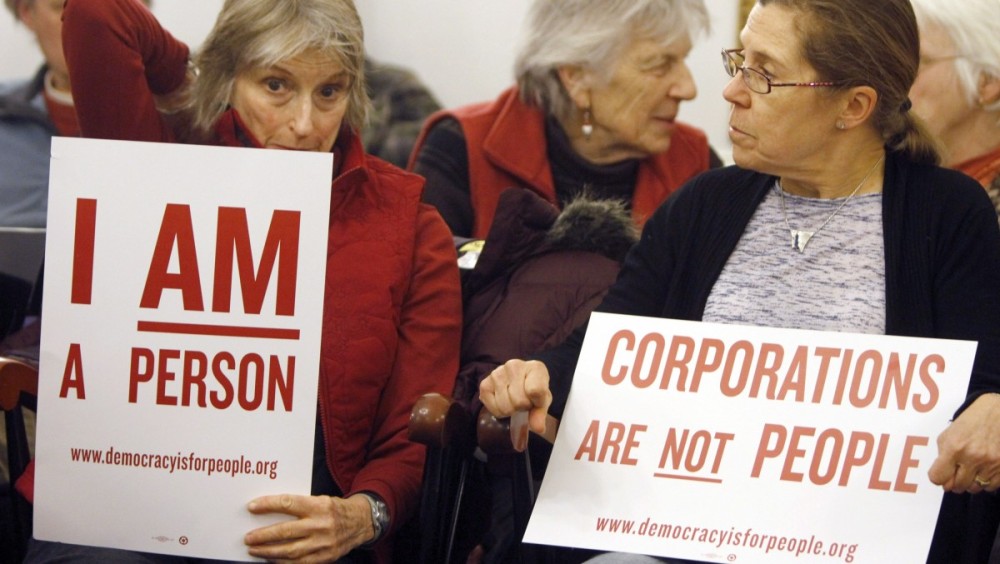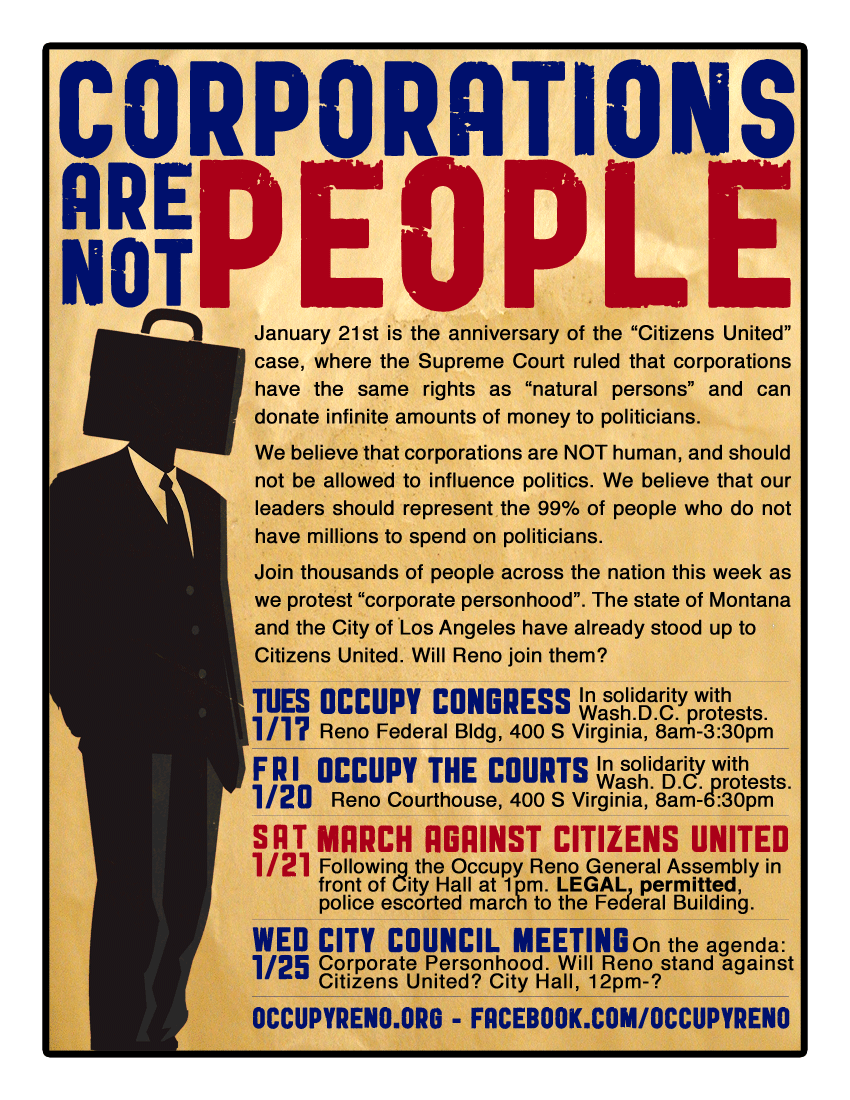If you are new to the Ask an Attorney Series – welcome! Check out why the heck this is happening, as well as the answer to my first question by clicking here. Don’t forget to leave your questions in the comment box; they may be featured in my next post!

SECOND QUESTION: Can we please just repeal Citizens United already? What a disaster!!
One comment last week suggested I write about my favorite landmark decisions. Which got me thinking about the number of Supreme Court cases that the vast majority of people – no matter how intelligent or educated – straight-up don’t understand.
The biggest case getting thrown around alongside all kinds of misinformation these days is called CITIZENS UNITED v . FEDERAL ELECTION COMMISSION. You have probably heard about it from Bernie Sanders or some of his ardent supporters. His website even lays out his misunderstanding of the case, where he says, “The Citizens United decision hinges on the absurd notion that money is speech, corporations are people, and giving huge piles of undisclosed cash to politicians in exchange for access and influence does not constitute corruption.” Later, on the same page, he promises that as President, he would nominate judges who would overturn Citizens United. (Ironically, the case was brought by a corporation that wanted to advertise and air an anti-Hillary Clinton film during primary season.)
Senator Sanders does an excellent job here of summarizing the public’s misunderstanding of this case. So we’ll break down what he says to cover our bases. Claim #1: It is an absurd notion that money is speech. Talking is speech. Writing is speech. Photos are speech. Paintings are speech. Movies are speech. Commercials are speech. Money is speech.
It costs money to get your speech to the listeners. Printing newspapers, publishing ads in magazines, supporting your website, manufacturing signs and t-shirts: it all costs money. The right to free speech cannot be exercised without the companion right to fund said speech.
If you would like a concrete example of how we know money is speech, consider the amount of money candidates – including Senator Sanders – must and do raise to fund their campaigns. To make a speech in a high school auditorium is one thing, but to pay cameramen and interns to film it and publish it on Facebook is far more effective – and costs money.
In conclusion: yes, money is speech. Or more accurately, money makes speech possible. It would be hypocritical of anyone concerned with the amount of money corporations spend on political speech to suggest otherwise.
Claim #2: It is an absurd notion that corporations are people. Some vocabulary: People vs. Person. You thought they were the same? They are not.

Both of these signs are correct, and neither one is inconsistent with Citizens United.
Let’s go back to that Bill of Rights we discussed last week. If you take a chance to read through the first ten amendments, you will notice a few things: (1) If you wrote them in tenth grade, your English teacher would have gone full red-pen on you. They were not written in a clear way. (2) Sometimes the Bill of Rights reserves right to people, sometimes persons, and sometimes it is not clear at all.
People: are human beings, and sometimes more specifically citizens (either of the United States or individual states therein).
Persons: are sometimes people, and sometimes corporations, partnerships, or other entities.
“So far as legal theory is concerned, a person is any being whom the law regards as capable of rights and duties. Any being that is so capable is a person, whether a human being or not, and no being that is not so capable is a person, even though he be a man. Persons are the substances of which rights and duties are the attributes.” John Salmond, Jurisprudence 318.
*Important side note: what I love about what John Salmond is saying here is that those who receive the rights of persons also have the duties of persons (like being held accountable for damages they cause; i.e. being sued). There is a trade-off. Not everyone sees it this way, but I see it as a significant benefit that when one is harmed by the actions of a corporation, he or she can pursue all the assets (and insurance policies) of the entire corporation, not just the suits behind the veil.*
Now zoom in on the first amendment, which is one of those ambiguous ones. It states: “Congress shall make no law respecting an establishment of religion, or prohibiting the free exercise thereof; or abridging the freedom of speech, or of the press; or the right of the people peaceably to assemble, and to petition the government for a redress of grievances.”
Did you notice that the only time one of our key words was mentioned was in stating that Congress shall make no law abridging “the right of the people to peaceably assemble.” The remaining protected rights in the first amendment – like freedom of speech – are not so clear. Do they belong to people? Persons? Who knows? That is one thing the Citizens United Court had to figure out.
David Silver, Esq., stated it so well in this comment feed, I’ll just repeat it here: “Corporations Are People: The Court never makes this claim. Corporations are legal persons, and have been in the law for some time (Dartmouth College v. Woodward, 1819). Justice Scalia added in his concurrence: ‘The Amendment is written in terms of “speech,” not speakers…We are therefore simply left with the question whether the speech at issue in this case is “speech” covered by the First Amendment . No one says otherwise. A documentary film critical of a potential Presidential candidate is core political speech, and its nature as such does not change simply because it was funded by a corporation. Nor does the character of that funding produce any reduction whatever in the “inherent worth of the speech.”‘”
To conclude: you are correct, Senator Sanders, corporations are not people. But the point you are trying to make (that, unlike people, corporations do not have Constitutional rights) is incorrect. As persons, corporations can sue and be sued, enter into contracts, and have the right to due process of law and to free speech (and to fund said speech).

Now you can see all the inaccuracies in this poster, can’t you?
Claim #3: It is absurd that giving huge piles of undisclosed cash to politicians in exchange for access and influence does not constitute corruption. There are some big inaccuracies in this statement, but I understand the sentiment. One falsehood is the claim that corporations can now give huge piles of cash to politicians. Citizens United did not change the federal ban on direct corporate contributions to political campaigns. Let’s not forget that this whole case was about airing an anti-Hillary Clinton film. The other falsehood is this whole “undisclosed” business. Did you ever notice those disclaimers at the end of a political commercial that says, “Paid for by…..” Those are not included voluntarily.
But if you look closely at the Senator’s words, he doesn’t even claim that corporations give huge piles of undisclosed cash; he is complaining about any donation of “huge piles of cash.” Senator Sanders, are you even concerned with individuals donating money to campaigns? Surely, Americans can donate money to your campaign as much as they want, right? If Senator Sander would rather muzzle all political speech except from a single, tax-payer funded treasury, then no person would have the freedom of speech – corporations of otherwise.
I do not claim our system is perfect by any means, but the underlying value is for democracy: that all persons should have the freedom to voice their political opinions. And, true, some persons have greater ability to exercise said speech; but the Constitution does not promise that all have the same influence.
I greatly appreciated the Los Angeles Times editorial by John O. McGinniss, where he made this distinction so clear, “But the 1st Amendment guarantees freedom, not equality. Rights are exercised to radically unequal degrees, and the right to speech is no exception. Some people are wealthy and can push their views with their money. Others work for the media or academia and can advance their opinions disproportionately in those settings. Still others command extra attention through celebrity. Most citizens have none of these advantages, but sometimes they join together to amplify their influence. In a free society, what law could succeed in purging elections of the unequal influences of the celebrated, the well-connected or the wealthy? Restricting one group would just magnify the influence of others.”
In conclusion: what you call, in your opinion, corruption, the United States Constitution calls freedom. And since we have already established that money is speech and corporations are persons, any attempt to limit the free speech of corporations – to pass Constitutional muster – would also have to limit the free speech of other persons, like your own campaign contributors.
Do you have questions you always wanted to ask an attorney? Leave them in the comments below and you might just get an answer!
-D. E. Barbi Bee